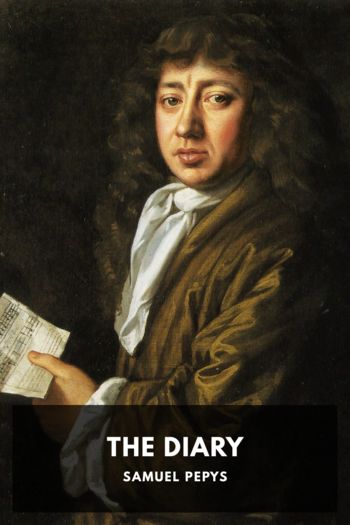The Diary - Samuel Pepys (red white and royal blue hardcover txt) 📗

- Author: Samuel Pepys
Book online «The Diary - Samuel Pepys (red white and royal blue hardcover txt) 📗». Author Samuel Pepys
Mrs. Bagwell. See ante, February 14th, 1664–65. ↩
Each of the Commissioners for the Sick and Wounded was appointed to a particular district, and Evelyn’s district was Kent and Sussex. On September 25th, 1665, Evelyn wrote in his Diary: “My Lord Admiral being come from ye fleet to Greenewich, I went thence with him to ye Cockpit to consult with the Duke of Albemarle. I was peremptory that unlesse we had £10,000 immediately, the prisoners would starve, and ’twas proposed it should be rais’d out of the E. India prizes now taken by Lord Sandwich. They being but two of ye Commission, and so not impower’d to determine, sent an expresse to his Majesty and Council to know what they should do.” ↩
Evelyn purchased Sayes Court, Deptford, in 1653, and laid out his gardens, walks, groves, enclosures, and plantations, which afterwards became famous for their beauty. When he took the place in hand it was nothing but an open field of one hundred acres, with scarcely a hedge in it. ↩
Apparently Thomas Beckford the slopseller, who was afterwards knighted (see note 868). Mr. Frank Cundall has written a valuable article on the Beckfords in the Journal of the Institute of Jamaica, vol. i, no. 8, p. 349. Mr. Cundall suggested to the editor that this may be Captain Edward Beckford, who is mentioned in a deposition dated December 18th, 1668, calendered by Mr. W. Noel Sainsbury in the Calendar of State Papers, Colonial Series (America and West Indies, 1661–68, p. 635). Thomas Beckford, however, is referred to in August, 1666, as Major Beckford, and therefore he may well have been a captain in 1665. ↩
John Tooker, Navy Office messenger. See ante, April 5th. ↩
Judith Penington was daughter of the Parliamentarian Alderman Isaac Penington, and sister of Isaac Penington the Quaker, and of Arthur Penington, who became a Roman Catholic priest. A letter to Judith Penington from her brother Isaac, in which he addresses her on her religious state, is printed in Maria Webb’s The Penns and Peningtons of the Seventeenth Century, 1867, p. 311: “Is thy soul in unity with God, or art thou separated from Him? Whither art thou travelling? oh, whither art thou travelling?” ↩
A false report. Alexander VII did not die till 1667. ↩
Philip IV, King of Spain, who succeeded to the throne in 1621, died in 1665. He was succeeded by his son Charles II. ↩
The King and Court removed to Oxford from Salisbury on September 23rd. ↩
Captain Jeremiah Smith (or Smyth), knighted June, 1665; Admiral of the Blue in 1666. He succeeded Sir William Penn as Comptroller of the Victualling Accounts in 1669, and held the office until 1675. ↩
At Swakeley House. See September 7th, 1665. ↩
Sion House, granted by Edward VI to his uncle, the Duke of Somerset. After his execution, 1552, it was forfeited, and given to John Dudley, Duke of Northumberland. The duke being beheaded in 1553, it reverted to the Crown, and was granted in 1604 to Henry Percy, Earl of Northumberland. It still belongs to the Duke of Northumberland. ↩
Monk, Duke of Albemarle. ↩
Judith Penington. See ante, note 2692. ↩
This person, erroneously called by Pepys Sir C. Herbert, will be best defined by subjoining the inscription on his monument in Westminster Abbey: “Sir Charles Harbord, Knight, third son of Sir Charles Harbord, Knight, Surveyor-General, and First Lieutenant of the Royal James, under the most noble and illustrious Captaine, Edward, Earl of Sandwich, Vice-Admiral of England, which, after a terrible fight, maintained to admiration against a squadron of the Holland fleet, above six hours, neere the Suffolk coast, having put off two fireships; at last, being utterly disabled, and few of her men remaining unhurt, was, by a third, unfortunately set on fire. But he (though he swome well) neglected to save himselfe, as some did, and out of perfect love to that worthy Lord, whom, for many yeares, he had constantly accompanyed, in all his honourable employments, and in all the engagements of the former war, died with him, at the age of xxxii, much bewailed by his father, whom he never offended; and much beloved by all for his knowne piety, vertue, loyalty, fortitude, and fidelity.” —B. ↩
James Sotherne, secretary to Sir W. Coventry, and afterwards himself Secretary of the Admiralty (see note 157). ↩
The Duke of York’s letter appointing Thomas Wilson Surveyor of the Victualling of His Majesty’s Navy in the Port of London, and referring to Pepys as Surveyor-General of the Victualling Affairs, is printed in Memoirs of the English Affairs, Chiefly Naval, 1660–73, by James, Duke of York, 1729, p. 131. ↩
This sum was granted by the Commons to Charles, with a request that he would bestow it on his brother. —B. ↩
Edward Coleman, musical composer and singer, who undertook the character of Alphonso when the first part of D’Avenant’s The Siege of Rhodes was acted at Rutland House in 1656. His wife represented the character of Ianthe at the same time. ↩





Comments (0)